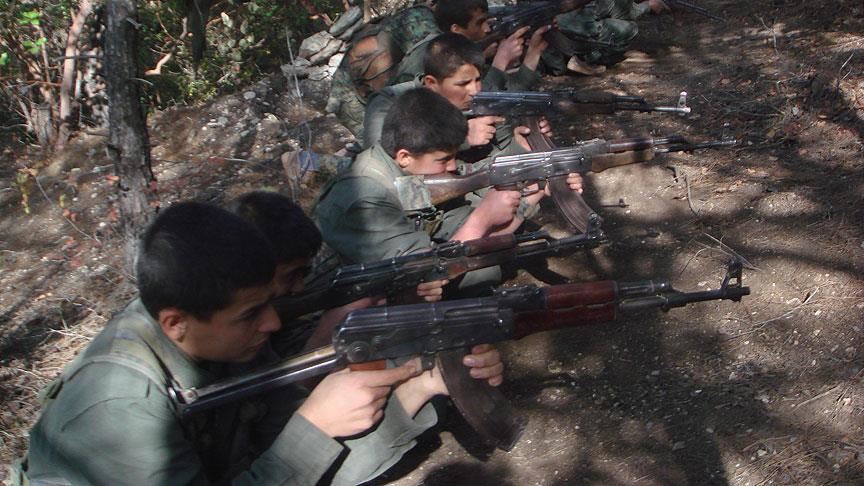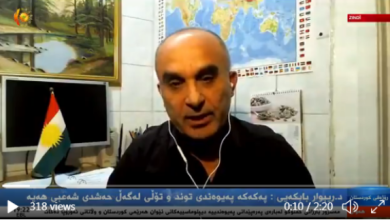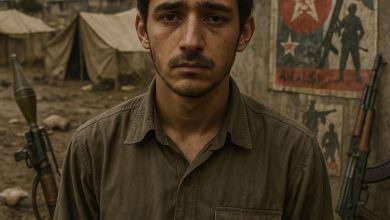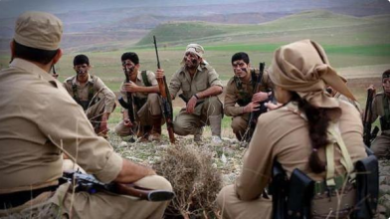In the winter of 2024, Mohammad Moradi, a fifteen-year-old boy from Mahabad, was lured by the propaganda of the armed group PJAK on Telegram and joined its ranks. Just four months later, however, he faced the bitter reality of forced labor, brainwashing, and being sent to his death, ultimately leading him to escape. His account provides a clear picture of the PKK’s Iranian wing’s policy of recruiting child soldiers.
In the cold winter of 2024, a fifteen-year-old boy from Mahabad quietly left home. Not with a weapon or a slogan, but with his mobile phone. A few Telegram messages, a couple of promises of freedom and equality, and a few simple sentences from someone who introduced himself as “Awat” were enough for Mohammad Moradi to decide to flee his poor, stressful life at home and join the armed group PJAK.
He is one of hundreds of teenagers who, in recent years, have fallen into the trap of the virtual propaganda of the PKK’s Iranian wing—a group that, under the guise of “Kurdistan’s freedom,” recruits forces from disgruntled, angry, or lonely children. This report tells Mohammad’s story—a narrative of deception, forced labor, brainwashing, and, finally, escape.
In the Kurdish regions of Iran, a combination of poverty, unemployment, migration, and a generation gap has created a fertile ground that armed groups like PJAK exploit. They target the minds of teenagers with slogans of justice and images of “mountain heroes.” But hidden behind these slogans is a reality of forced labor, psychological control, and premature death.
Mohammad Moradi, born on June 3, 2008, in Mahabad, is an example of these victims. A boy with an incomplete education and a difficult life, he sought refuge not in school or society, but on Telegram pages. The result was his entry into a cycle that nearly ended his life.
Full Transcript of the Interview with Mohammad Moradi, Former Member of the Armed Group PJAK
Tell us a little about yourself, your life before joining PJAK.
I am Mohammad Moradi, born on June 3, 2008, in Mahabad. I studied until the first year of middle school, but then I stopped. Our family’s financial situation was poor; my father was a seasonal laborer and often unemployed. Since I was twelve or thirteen, I started working myself, in shops or on construction sites. My relationship with my family, especially my father, was always tense. He was strict, and I was stubborn. We were constantly arguing. It reached a point where I felt no one at home understood me.
During that time, I mostly kept myself busy with my phone. Telegram, channels, various groups… everyone was talking. Among them, some channels spoke about “PJAK” and the “struggle for the freedom of Kurdistan.” At first, I only looked out of curiosity, but then I gradually felt they were saying things that resonated with me—about oppression, injustice, and young people who should do something for “their people’s future.” The kind of words that appeal to an angry, disillusioned teenager.
How did you decide to actually go and join them?
No big decision is made overnight. A few people talked to me on Telegram. One of them introduced himself as “Awat” and said he was a PJAK member. He treated me very cordially, making me feel like someone was finally taking me seriously. He constantly spoke about the hard life in the mountains and about self-sacrifice for the people, and he would ask me: “If you are so unhappy with your life, why don’t you do something?”
He told me that if I came, they would treat me like family, I would get training, receive a salary, and might even become a commander after a while. Exhausted with my daily life, and without telling anyone, I ran away a night or two later and headed toward the border. It was the winter of 2024.
When you arrived, what did you see? Was it what they had promised?
Not at all. When I arrived, they first took me to a place in the mountainous regions; I didn’t know exactly where. From the very first day, I realized there was no “freedom and equality.” Everything was military and rigid. I faced people who, instead of being “comrades,” would shout and give orders.
For the first two months, I was essentially a laborer, not a group member. Our work was digging tunnels and caves, using tools like jackhammers and explosives. We worked from morning till night deep inside the mountain. No one asked how old I was; the only thing that mattered was that the work got done. Due to sheer exhaustion, some nights I slept on the stone ground. Food was scarce, the weather was cold, and we didn’t have enough clothes. I was injured a few times because I didn’t know how to use the jackhammer. But no one cared.
After those two difficult months, you said you entered the training period. What was that like?
We had about thirty days of training. The training had two parts: ideological and military. In the ideological part, we had to listen to long speeches about Abdullah Ocalan for hours. It was more like brainwashing than education. They demanded we become suspicious of our families, because, according to them, family is an obstacle to “liberation.” Anyone who asked questions or expressed doubt was accused of ideological weakness.
The military part, however, was truly brutal. They taught us how to survive in the mountains, how to cook without a fire, how to shoot a weapon, and how to evade drones. The drills were mostly at night. We didn’t get proper sleep. For me, who was a simple laborer just the day before, everything was unbearable.
What made you decide to escape?
I became terrified when I saw that the children who finished their courses were being sent to Turkey. Some who had been sent never reported back. Then I heard that most of them had been killed in Turkish drone strikes. It was then that I realized there was no future in this path. We were just tools, not fighters.
The fear of death became real. Four months had passed since I joined, and I was now certain I had to escape. I looked for an opportunity for a few nights. One night, when the guards had fallen asleep, I slipped away from the area, shaking with fear. I descended the mountain in the darkness. I walked for hours until I finally reached one of the safer areas near Sulaymaniyah.
How did you feel the moment you moved away from the area?
I can’t describe it. I felt both hope and confusion. I knew if I was caught, I would be killed. On the other hand, I didn’t know what would happen to me if I reached Iran. I just wanted to be out of that hell. When I arrived at a place where I knew the Asayish forces were present, I surrendered. A few days later, with their help, I was able to reach the Iranian consulate. In that moment, it was as if I came back to life.
What was the return to Iran like? How did they treat you?
Honestly, I was very afraid. I thought I might be arrested or punished. But on the contrary, their treatment was humane. They asked me why I had left, what I had seen, and how I had returned. I told them everything, without hiding anything. A few days later, they allowed me to return to my family. My father cried when he saw me. He never thought he would see me again.
Now that you are back, what do you feel when you reflect on the past?
More than anything, I feel shame—not for escaping, but for being so easily deceived. Because of my anger towards my father and my family problems, I entered a path that nearly cost me my life. PJAK exploited my feelings, my inexperience, and my loneliness. Now that I think about it, I see that nothing there was about freedom. It was all lies and death.
I know I can’t change the past, but I can issue a warning. If there is a teenager like me who thinks the way to salvation is joining these groups, they need to know that they are only looking for victims, not heroes. Real life is outside the mountains, with family, among the people—not in tunnels and caves.
Mohammad Moradi is not an isolated case. PJAK has used patterns in Iranian and Iraqi Kurdistan for years, such as: identifying vulnerable teenagers online, building emotional connections and instilling a sense of value, promising training and responsibility, cutting the individual’s ties with their family, and then military recruitment.
From a sociological perspective, this process is a form of emotional and psychological exploitation; PJAK effectively fills the educational and economic void in families to forge war fuel from the anger or despair of teenagers.
At fifteen, Mohammad became a victim of this very mechanism—a boy who only wanted to be seen, but instead of being seen, he was exiled to the mountains.
Mohammad Moradi’s account is a public warning.
For years, PJAK and the PKK have been creating victims under the banner of “freedom,” using the blood of young people to sustain a futile war.
Mohammad’s rescue represents a hope for awareness; however, as long as poverty, unemployment, and the generational gap persist in Kurdistan, this cycle will continue to claim victims.






